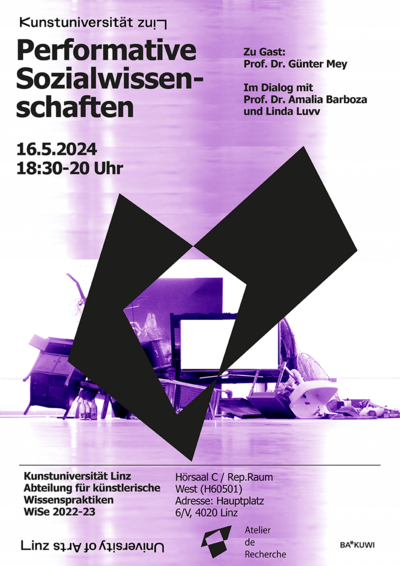Welcome at the Interface Culture program website.
Acting as creative artists and researchers, students learn how to advance the state of the art of current interface technologies and applications. Through interdisciplinary research and team work, they also develop new aspects of interface design including its cultural and social applications. The themes elaborated under the Master's programme in relation to interactive technologies include Interactive Environments, Interactive Art, Ubiquitous Computing, game design, VR and MR environments, Sound Art, Media Art, Web-Art, Software Art, HCI research and interaction design.

The Interface Culture program at the Linz University of Arts Department of Media was founded in 2004 by Christa Sommerer and Laurent Mignonneau. The program teaches students of human-machine interaction to develop innovative interfaces that harness new interface technologies at the confluence of art, research, application and design, and to investigate the cultural and social possibilities of implementing them.
The term "interface" is omnipresent nowadays. Basically, it describes an intersection or linkage between different computer systems that makes use of hardware components and software programs to enable the exchange and transmission of digital information via communications protocols.
However, an interface also describes the hook-up between human and machine, whereby the human qua user undertakes interaction as a means of operating and influencing the software and hardware components of a digital system. An interface thus enables human beings to communicate with digital technologies as well as to generate, receive and exchange data. Examples of interfaces in very widespread use are the mouse-keyboard interface and graphical user interfaces (i.e. desktop metaphors). In recent years, though, we have witnessed rapid developments in the direction of more intuitive and more seamless interface designs; the fields of research that have emerged include ubiquitous computing, intelligent environments, tangible user interfaces, auditory interfaces, VR-based and MR-based interaction, multi-modal interaction (camera-based interaction, voice-driven interaction, gesture-based interaction), robotic interfaces, natural interfaces and artistic and metaphoric interfaces.
Artists in the field of interactive art have been conducting research on human-machine interaction for a number of years now. By means of artistic, intuitive, conceptual, social and critical forms of interaction design, they have shown how digital processes can become essential elements of the artistic process.
Ars Electronica and in particular the Prix Ars Electronica's Interactive Art category launched in 1991 has had a powerful impact on this dialog and played an active role in promoting ongoing development in this field of research.
The Interface Cultures program is based upon this know-how. It is an artistic-scientific course of study to give budding media artists and media theoreticians solid training in creative and innovative interface design. Artistic design in these areas includes interactive art, netart, software art, robotic art, soundart, noiseart, games & storytelling and mobile art, as well as new hybrid fields like genetic art, bioart, spaceart and nanoart.
It is precisely this combination of technical know-how, interdisciplinary research and a creative artistic-scientific approach to a task that makes it possible to develop new, creative interfaces that engender progressive and innovative artistic-creative applications for media art, media design, media research and communication.
Performative Sozialwissenschaften
16. Mai 2024, 18.30 bis 20.00 Uhr Kunstuniversität Linz, Hörsaal C, Hauptplatz 6, 4020 Linz
Prof. Dr. Günter Mey im Dialog mit Prof. Dr. Amalia Barboza und Linda Luvv
Zum Verhältnis von performativer Sozialwissenschaft und qualitativer Forschung
Günter Mey, Professor für Entwicklungspsychologie an der Hochschule Magdeburg-Stendal, Privatdozent an der Universität Bayreuth sowie Leiter des Instituts für Qualitative Forschung an der Internationalen Akademie Berlin
Jenseits der vielfältigen Formen künstlerischer Forschung (Artistic Research) an Kunsthochschulen und Kunstuniversitäten hat sich die Performative Sozialwissenschaft (Performative Social Science, kurz: PSS) als ein Ansatz etabliert, mit dem qualitativ Forschende ihre Studien in den Sozial- und Humanwissenschaften unter Nutzung von künstlerisch-ästhetischen Mitteln betreiben und umsetzen. Im Zuge der Ausbreitung der PSS hat sich eine Fülle an Präsentationsarten entwickelt: in Textform (Autoethnografie, Fiction, Poetik), als Inszenierungen (Theater, Tanz und Musik) und als visuelle Darbietungen (Film, Foto, Comic) sowie in Form von Ausstellungen/Installationen und Web-Animationen.
In dem Vortrag – mit einer Übersicht der Grundlinien von PPS und der Vorstellung einiger ausgewählter Beispiele, u.a. solche, an denen der Vortragende selbst arbeitet – wird der Fokus auf den Ansatz der Arts-informed Research liegen, der als Antwort verstanden werden kann angesichts der wachsenden Kritik an traditionellen Darstellungspraxen von Wissenschaft und deren begrenzter Verbreitung sowie eingeschränkter öffentlicher Wirksamkeit.
Günter Mey ist seit 2009 Professor für Entwicklungspsychologie im Fachbereich Angewandte Humanwissenschaften der Hochschule Magdeburg-Stendal und seit 2015 Privatdozent an der Kulturwissenschaftlichen Fakultät der Universität Bayreuth, zudem hatte er Gastprofessuren an den Universitäten Klagenfurt und Wien sowie Gastaufenthalte an den Universitäten Luzern/CH und Aalborg/DK. Er gründete 2005 das Institut für Qualitative Forschung an der Internationale Akademie Berlin, dessen Co-Leiter er bis heute ist und u.a. das jährliche „Berliner Methodentreffen Qualitative Forschung“ ausrichtet. Zu seinen Arbeitsschwerpunkten gehören qualitative Forschung, insbesondere Grounded-Theory-Methodologie sowie performative Sozialwissenschaft und Wissenschaftskommunikation; thematisch beschäftigt er sich mit Jugendkulturen, Generationalität und Biografie/Identität. Neben seiner Mitherausgeberschaft von „FQS – Forum Qualitative Sozialforschung/Forum: Qualitative Social Research“ verantwortet er viele Handbuch-Editionen, Buchbeiträge und Zeitschriftenartikel und er hat sozialwissenschaftliche Filme realisiert und Ausstellungen kuratiert.
